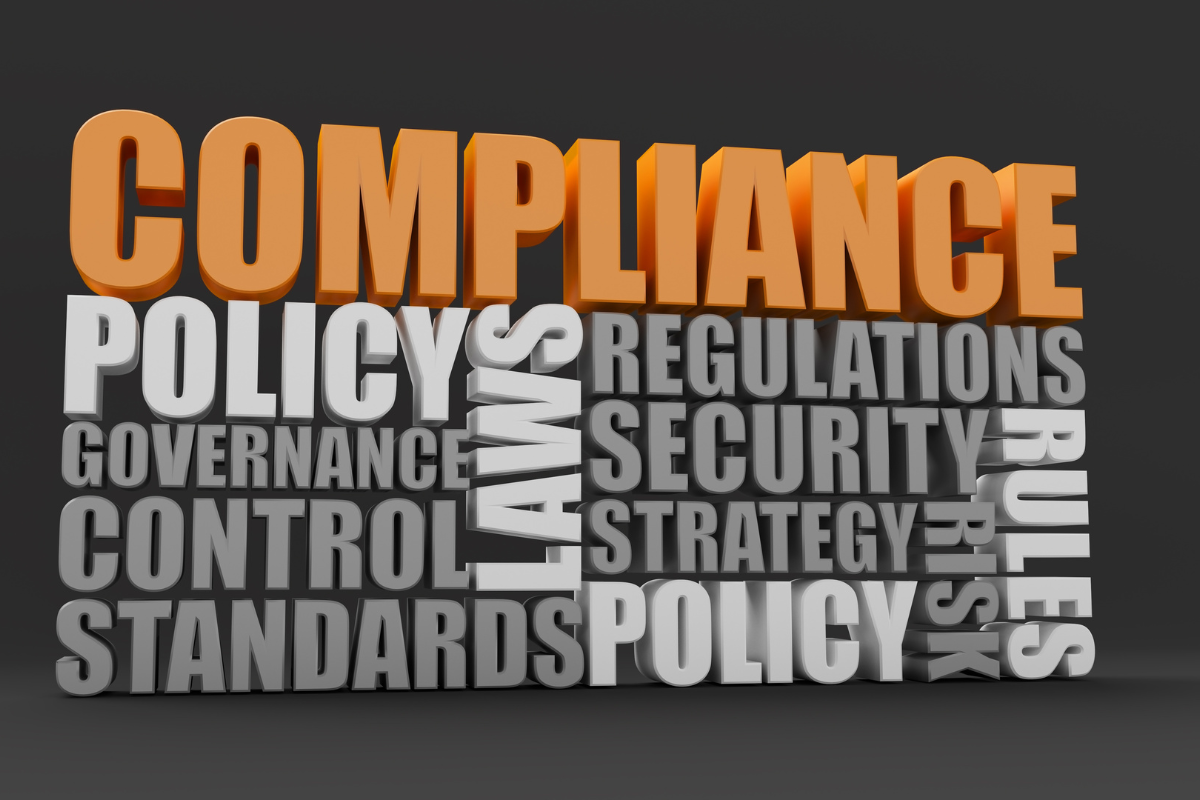Finance Forward Blog
An Effective Small Business Tax Compliance Strategy for the Future

An Effective Small Business Tax Compliance Strategy for the Future
As a small business owner, it can be difficult to make sense of the varied and complex tax laws and regulations set forth by the IRS. To simplify this daunting task, here is an overview of creating an effective strategy to ensure compliance with taxation policies tailored to businesses like yours. With these guidelines, navigating through taxes won’t feel so intimidating anymore!
Short Summary
Understand and adhere to the IRS tax code, develop a comprehensive strategy for compliance, and stay updated on federal & state laws.
Implement efficient record-keeping systems. Assess business structure & requirements. Identify nexus triggers when navigating multi-state taxes.
Utilize available tax incentives/programs and seek professional assistance as needed.

Understanding Tax Compliance for Small Businesses
Small businesses must develop an efficient tax compliance strategy to promote economic growth and avoid the tax gap. Adhering to the federal regulations laid out by the IRS is essential, as this agency enforces taxation laws all over America. The Internal Revenue Service provides resources for small companies looking into their exact obligations with respect to taxes so that they can understand them properly without any misunderstandings or difficulties arising from state laws, such as withholding on nonresident employees’ payouts. There are costs associated with setting up a comprehensive system like this. Still, if done well, it offers long-term value far greater than just financial gains, too: a reliable framework regarding filing accurately ensures better future planning opportunities for your business’s success overall!
The Role of the IRS
The IRS works to facilitate tax compliance for small businesses, which account for 99% of all business types. To this end, the Internal Revenue Service has developed a Payment Card Pilot Program which seeks to address taxpayer non-compliance and increase financial efficiency with regard to taxes collected. The Government Accountability Office (GAO) report concerning the program highlights ways that money spent by the IRS can be better used to achieve company tax submission fulfillment, so proper action is being taken toward improved business taxation adherence. By taking on board the proposed actions highlighted within it, navigating through these waters should become simpler when dealing with your own or other companies’ fees.
Common Tax Compliance Challenges
Tax compliance can pose several difficulties for small companies. Keeping track of documents, filing taxes, and managing records tend to use much time and resources that could otherwise be put towards other business operations. The taxation requirements may depend on asset size, the entity type being filed with, or the number of staff members in specific industries. When measured regarding their funds generated from sales or the number of employed people, larger corporations have greater regulations they must adhere to - thus enhancing their tax burden significantly.

Developing a Comprehensive Tax Compliance Strategy
Tax compliance is a crucial component of doing business, and companies must create an effective strategy to manage their tax obligations. This roadmap should be tailored to the company’s individual requirements through thorough assessment while staying up-to-date with federal and state laws can help businesses access incentives or other benefits for paying taxes.
It’s important that businesses understand all relevant regulations in order to keep compliant with authorities. This helps mitigate any risks associated with paying taxes too late or incorrectly filing returns. A comprehensive tax compliance strategy will provide clear guidance on necessary recordkeeping, reporting needs, and optimal methods for making payments according to applicable taxation policies at different levels within government bodies.
Assessing Business Structure and Requirements

Understanding the filing requirements of one’s business structure is essential for establishing a tax compliance strategy. Corporations, for instance, must follow strict regulations such as arranging yearly board and shareholder meetings with documented minutes and actively maintaining their bylaws. On the other hand, LLCs need to update their operating agreement annually but have fewer overall rules to abide by. Even though certain businesses may not require these types of procedures internally, they are still advised to document any significant decisions made within them to comply with up-to-date filings come tax season.
Staying Updated on Federal and State Tax Laws
Tax compliance is a must for businesses, and to stay on top of it, they need to be aware of the ever-changing federal and state laws. This means being up-to-date on all income taxes (federal, self-employment, payroll), local and sales levies, and The Affordable Care Act. Companies can do this by subscribing to newsletters or attending seminars. Consulting with tax professionals (like J. Hall & Company!) also helps you remain compliant to avoid penalties.

Implementing Efficient Record Keeping and Reporting Systems
Accurate record-keeping is necessary for businesses to meet tax regulations and verify data on financial records. Efficient systems that ensure compliance with the law can help detect potential fraud, manage cash flow, support decision-making processes, and save time and costs. Modern tools such as software solutions allow companies to simplify their methods of recording information while staying true to government requirements. This enables them to stay compliant and identify ways in which operations could be optimized or what opportunities for growth exist within the business framework.
Tools and Software Solutions
Businesses can make the journey of tax compliance less daunting with several available options to simplify their filing process. Software and tools include accounting software like Zoho Books, FreshBooks, Xero, or Intuit Quickbooks. Record-keeping solutions, including DocuWare and Microsoft Sharepoint are essential for businesses to manage their tax obligations in this digital era effectively. With these technologies serving them as guiding stars throughout the terrain they must traverse when it comes to fulfilling compliance requirements of taxation laws - businesses have become more organized than ever before.
Importance of Regular Financial Reviews
Financial reviews serve as a roadmap for businesses throughout their dealings with taxation. They are essential in helping companies stay up-to-date on record keeping and be aware of any compliance issues that may arise. It also allows them an opportunity to cut costs while increasing efficiency, all with the help of their finance team.
Looking at incomes, debts, investments, and other financial obligations regularly helps companies understand where they stand when nearing the retirement due date, creating clarity through sound fiscal strategies provided by said departmental professionals.

Navigating Multi-State Taxes and Nexus Rules
Businesses must be mindful of multi-state tax requirements and nexus rules to remain compliant. Working out what your obligations are can seem like an intimidating task, but with the proper understanding and assistance, it is possible for businesses to navigate these waters properly.
The elements which trigger a business’s presence within certain states have several common forms – whether there is an office or staff based in that state, if there have been enough sales from the area over time, or depending on how many transactions you carry out across borders. Identifying those thresholds accurately allows companies to correctly identify their taxes when doing work beyond one jurisdiction - crucial for ensuring they stay up-to-date with necessary regulations.
Identifying Nexus Triggers
Businesses must be able to spot certain ‘nexus triggers’ in order to understand their tax obligations accurately. These activities signify a relationship between the company and a state, thus requiring it to collect sales taxes for that specific area. Examples of such actions include having staff work there or conducting economic activity within said borders.
Identifying these is only half of the battle. Businesses also need knowledge regarding each state’s individual taxation regulations where they have established a nexus with another jurisdiction. This information will prove invaluable when calculating exact amounts due during compliance processes.
Managing Sales Tax Collection and Filing
Businesses should manage their sales tax collection and filing to fulfill their taxation obligations. They need to calculate the proper amount of taxes on each sale, collect it from customers, store accurate records about these transactions, and acquire a business license. They must submit returns with due tax payments to the corresponding authorities in good time. If properly managed with precision and accuracy according to state laws, you can ensure that you meet all requirements without any hassles or delays.

Seeking Professional Assistance and Representation
Small businesses may find it difficult to maneuver through the tax landscape. Tax laws and regulations are often complex, making professional aid and representation an invaluable resource for these companies trying to ensure full compliance with all applicable requirements. With a knowledgeable guide at their side, small enterprises can easily traverse this complicated terrain while saving time and resources along the way. Professional help should especially be sought when dealing with complex circumstances such as multiple state taxes or outstanding liabilities regarding taxation matters.
When to Hire a Tax Expert
For businesses dealing with complex tax regulations, laws, and multifaceted taxes, a specialist in taxation can be of great help. They provide the direction needed to successfully maneuver through difficult situations such as unpaid obligations or different state-specific rules & regulations, helping to ensure compliance is achieved for every business. Hiring a tax professional allows companies to become aware of their fiscal requirements while avoiding potentially costly mistakes along the way.
Choosing the Right Representation
Businesses must select a suitable representation when addressing their tax obligations, as vital as enlisting the help of an experienced accountant. They should consider numerous factors such as areas of expertise, experience, and knowledge of local regulations, pricing plans, and job history, for that matter. These components are especially important in providing businesses with reliable assistance while reducing possible risks associated with compliance matters concerning taxes.
The appropriate representatives can be likened to seasoned advisors who work hand-in-hand with companies throughout the complex process involving satisfying requirements regarding taxation systems.

Utilizing Tax Incentives and Compliance Programs
Businesses can use tax incentives and compliance programs as a form of guidance to reduce their taxation requirements. Offering businesses relief or other types of rewards for meeting pre-defined criteria, such initiatives provide much-needed assistance in minimizing taxes paid while still adhering to the law. Small business owners may find advantages with options like credits on health insurance premiums plus family/medical leave payouts. Not forgetting research and development incentive plans, too. Voluntary disclosure schemes allow taxpayers to come forward without worrying about harsh punishments due to waiving penalty sections when disclosure voluntarily is involved.
Understanding Available Tax Incentives
Businesses can rely on various tax incentives available to help them in their compliance journey. An example is a credit given to small businesses for health insurance premiums, helping to defray the cost of covering this expense for workers. Another incentive that aids companies is an employer-provided family and medical leave benefit. It financially supports employers by administering paid time off. Firms may qualify for relief from research and development costs through what’s known as the R&D tax credit program. All these strategies come together so businesses are better equipped to deal with taxes-related issues, such as providing coverage or conducting research activities professionally yet inexpensively.
Evaluating Participation in Compliance Programs
It is imperative that businesses evaluate their participation in compliance programs, so they can be sure of staying on track. Such evaluations should look into the efficacy of these initiatives in avoiding misconduct and consider employee involvement, internal oversight operations, and successful communication flow.
By conducting regular reviews, firms will have a better awareness of potential pitfalls and ascertain if proper steps are taken to execute the program successfully. Adjustments can then be made accordingly for optimal results.
Summary
Tax compliance is a complex path for small businesses to navigate, with various laws and regulations that must be followed. With an in-depth comprehension of tax requirements, efficient record-keeping methods, and proper use of incentives at their disposal, small business owners can efficiently reach compliance, which can help lead them toward economic growth. It might not always be easy, but each step taken toward completing all necessary tasks helps a company grow closer to achieving sustainable business success.

